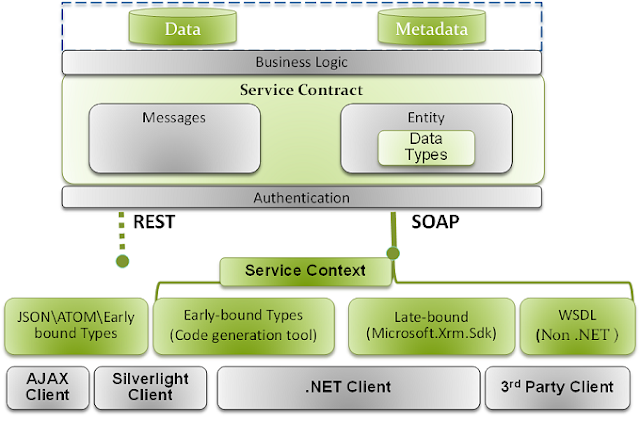Key programmability scenarios for MS Dynamics CRM 2011

Early-bound – MS Dynamics CRM 2011 uses an entity data model and Windows Communication Foundation (WCF) Data Services technologies to provide a new set of tools that interact with Microsoft Dynamics CRM. For example: an organization service context that tracks changes to objects and supports .NET Language-Integrated Query (LINQ) queries to retrieve data from MS Dynamics CRM. Early bound classes generated directly from the metadata, which include all customizations.
CrmSvcUtil.exe - CRM Dynamics 2011 Code Generation Tool
Late-bound – Write code that accesses entities that are not yet defined.
REST – The REST endpoint for AJAX and MS Silverlight clients provides an interface that you can use to work with MS Dynamics CRM data. Rather than directly invoking the SOAP-based web service, you can execute requests using a service that is based on a URI.
[Your Organization Root URL]/xrmservices/2011/organizationdata.svc
CRM Dynamics 2011 OData Query Designer
WSDL – Develop code from non-.NET clients, and does not depend on the use of MS Dynamics CRM assemblies. For example, Write code for MS Dynamics CRM in Java/PHP.
MS Dynamics CRM 2011 no longer uses the WSDL. Instead, reference two assemblies that allow to connect MS Dynamics CRM system for both early and late bound types.
Account entity = new Account();
entity["name"] = "My Account"; //loosely typed, late binding
entity.AccountNumber = "1234"; //strongly typed, early binding
Assemblies Included in the MS Dynamics CRM SDK
Client-Side Programming Reference
GetGlobalContext function - It returns the same context object found in the Xrm.Page.context.
<script type="text/javascript" src="ClientGlobalContext.js.aspx"></script>
Methods (Xrm.Page.context also) - getClientUrl, getOrgUniqueName, getServerUrl, getUserId, getUserRoles
Xrm.Page Reference
Xrm.Page.data.entity - addOnSave, save (null | "saveandclose" |"saveandnew"), getIsDirty (any fields in the form has been modified), getEntityName
Xrm.Page.ui - close, getFormType (1 create, 2 update, 3 read only, 4 diabled, 6 bulk edit
Summary of Changes Between Versions - 4.0/2011

Early-bound – MS Dynamics CRM 2011 uses an entity data model and Windows Communication Foundation (WCF) Data Services technologies to provide a new set of tools that interact with Microsoft Dynamics CRM. For example: an organization service context that tracks changes to objects and supports .NET Language-Integrated Query (LINQ) queries to retrieve data from MS Dynamics CRM. Early bound classes generated directly from the metadata, which include all customizations.
CrmSvcUtil.exe - CRM Dynamics 2011 Code Generation Tool
Late-bound – Write code that accesses entities that are not yet defined.
REST – The REST endpoint for AJAX and MS Silverlight clients provides an interface that you can use to work with MS Dynamics CRM data. Rather than directly invoking the SOAP-based web service, you can execute requests using a service that is based on a URI.
[Your Organization Root URL]/xrmservices/2011/organizationdata.svc
CRM Dynamics 2011 OData Query Designer
WSDL – Develop code from non-.NET clients, and does not depend on the use of MS Dynamics CRM assemblies. For example, Write code for MS Dynamics CRM in Java/PHP.
MS Dynamics CRM 2011 no longer uses the WSDL. Instead, reference two assemblies that allow to connect MS Dynamics CRM system for both early and late bound types.
Account entity = new Account();
entity["name"] = "My Account"; //loosely typed, late binding
entity.AccountNumber = "1234"; //strongly typed, early binding
Assemblies Included in the MS Dynamics CRM SDK
| Assembly name | Namespace name | |
| Microsoft.Crm.Sdk.Proxy.dll | Microsoft.Crm.Sdk | Contains enumerations of possible picklists and integer values for some attributes. |
| Microsoft.Crm.Sdk.Messages | Contains request and responses for business data model messages. | |
| Microsoft.Xrm.Sdk.dll Defines the core xRM methods and types. |
Microsoft.Xrm.Sdk | Defines the data contracts for attribute types. |
| Microsoft.Xrm.Sdk.Client | Defines classes for use by client-code, including a data context, proxy classes and the LINQ provider. | |
| Microsoft.Xrm.Sdk.Discovery | Defines classes required to communicate with the Discovery Service. | |
| Microsoft.Xrm.Sdk.Messages | Defines request/response classes for Create, Retrieve, Update, Delete, Associate , Disassociate, and the metadata classes. | |
| Microsoft.Xrm.Sdk.Metadata | Defines the data contracts for Microsoft Dynamics CRM metadata. | |
| Microsoft.Xrm.Sdk.Query | Defines query classes required to connect to Microsoft Dynamics CRM. | |
| Microsoft.Xrm.Sdk.Workflow.dll Defines types/methods required to author a custom workflow activity. |
Microsoft.Xrm.Sdk.Workflow | |
| Microsoft.Xrm.Sdk.Workflow.Activities | ||
| Microsoft.Xrm.Sdk.Workflow.Designers | ||
| Microsoft.Crm.Tools.EmailProviders.dll Defines methods/types for developing a custom email provider component |
Microsoft.Crm.Tools.Email.Management | |
| Microsoft.Crm.Tools.Email.Providers | ||
| Microsoft.Xrm.Sdk.Deployment.dll Defines types/methods for interacting with the Deployment Web Service. |
Microsoft.Xrm.Sdk.Deployment | |
| Microsoft.Xrm.Sdk.Deployment.Proxy |
Client-Side Programming Reference
GetGlobalContext function - It returns the same context object found in the Xrm.Page.context.
<script type="text/javascript" src="ClientGlobalContext.js.aspx"></script>
Methods (Xrm.Page.context also) - getClientUrl, getOrgUniqueName, getServerUrl, getUserId, getUserRoles
Xrm.Page Reference
Xrm.Page.data.entity - addOnSave, save (null | "saveandclose" |"saveandnew"), getIsDirty (any fields in the form has been modified), getEntityName
Xrm.Page.ui - close, getFormType (1 create, 2 update, 3 read only, 4 diabled, 6 bulk edit
Summary of Changes Between Versions - 4.0/2011



No comments:
Post a Comment